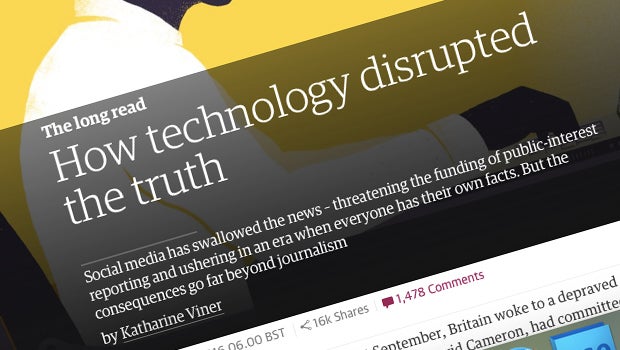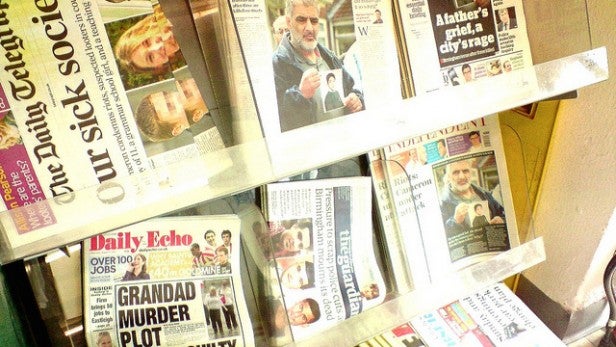Long Read: Dear Guardian, technology HAS disrupted the truth – but that’s a good thing

OPINION During the post-Brexit meltdown, blame has been apportioned to at least half of the continent and its actors, in one way or another. Now it’s technology’s turn to enter the stocks. Chris Smith fights tech’s corner.
In a long-form Guardian editorial-cum-mission statement, new Editor-in-Chief Katharine Viner eloquently and passionately argues that much of our apparent descent into a post-fact society, where truth matters less, can be laid at the door of social media and the internet.
It is alleged the rapid sharing of information through technology has allowed mistruths or half-truths to make their way around the globe in double quick time. It is argued that the race for clicks and (and, by connection, false clickbait reporting) has chipped away at the tenets of journalistic integrity.
As a member of both communities, I think that’s a little unfair on technology and its positive impact on an industry like journalism.
“In the digital age, it is easier than ever to publish false information, which is quickly shared and taken to be true,” Viner writes.
While not an incorrect statement, it does little justice to how the web and its various technological facets can be just as important an ally to democracy and truth as a free and impartial press.
In many cases, in the smartphone era, the news is delivered to us first hand.Through apps like Periscope, we can be placed at the scene of events and see things as they actually unfold. Though we inevitably bring our own biases to bear, we are theoretically impartial witnesses to the truth.
Think citizen-shot videos of police aggression in the United States, uprisings within oppressive regimes all over the globe, the unreported atrocities ‘elsewhere’ that don’t necessarily resonate with the Western news agenda – or even an ordinary mum in Middle America laughing hysterically wearing a Chewbacca mask.
The internet reveals more about the world than we’re used to seeing, not only ‘disrupting’ the conventional notion of ‘truth’, but uncovering new and often uncomfortable truths.
Social media has enabled the telling of these human stories in a way that ‘traditional’ journalism either cannot or has not. And by way of the organic nature of sharing, it has placed the power in the hands of people to decide what is newsworthy and what is not. Quite often, it’s now the media following up on stories that have risen under their own, thanks to technology.
A simple hashtag like #BlackLivesMatter can not only carry a message to millions, it can also organise and mobilise entire communities – and thereby help shape the dialogue with our leaders. Millions of voices can unite to hold the powerful to account in a manner that simply cannot be ignored. None of this was possible just 10 years ago.
Technology has enabled new voices to come to the fore. In the aftermath of the Brexit, it was not a paid columnist whose voice carried farthest. It was a member of the public commenting on an FT article.
While many variants floated around social networks, this particular one earned more than 32,000 retweets.
https://twitter.com/statuses/746272418075807745
Quite often, it is passionate social media commentators, unpaid for their efforts, doing the hard labour alongside career journalists – whether it is by double-checking the ‘facts’, examining the statements of the powerful and questioning their received wisdom, or by showing us things we otherwise wouldn’t have seen.
For example, if not for Lilly Allen’s intervention, would we have known about Nigel Farage and Rupert Murdoch’s little tête-à-tête at a garden party that coincidentally (or not) immediately preceded his resignation as UKIP leader?
https://twitter.com/statuses/749575921447960576
The click economy
Viner correctly argues that the need for money-spinning clicks in the digital age could hit the very fabric of journalism’s ability to stand always for truth and remain neutral. But that isn’t technology’s fault.
When it comes to clickbait, tech might be an enabler and we may be the addicts, but the media industry is often the drug pusher.
She writes: “The impact on journalism of the crisis in the business model is that, in chasing down cheap clicks at the expense of accuracy and veracity, news organisations undermine the very reason they exist: to find things out and tell readers the truth – to report, report, report.”
I’m a huge admirer of the Guardian and its commitment to strong, independent journalism. I’m proud to be a contributor on occasion. In an ideal world, all of our news organisations and their proprietors would hold true to that admirable edict.
Unfortunately, billionaires like Paul Dacre (Daily Mail), Rupert Murdoch (Sun) and Richard Desmond (Express) have used their outlets to further personal ideologies, political relationships and business interests for far too long.
For these men, accuracy was a secondary concern long before technology changed journalistic business models.
Criticising tech for facilitating a quick click economy seems like an updated version of accusing papers of printing false or sensationalised stories to increase sales. It’s the same people propagating the same problem, just through a different medium.
Indeed, if the EU referendum told us one thing, it’s of the terrifying power Fleet Street still wields. With its pro-Brexit propaganda, three men – that would be Murdoch, Dacre and the Desmond – perhaps had more influence on the result than Johnson, Gove and Farage, let alone anyone on the losing side of that particular vote.
Related: How Brexit will affect big tech

Holding old media to account
It was often said today’s news is tomorrow’s chip paper, but in The Sun’s case, today’s front-page splash can often be tomorrow’s piddling page 9 apology.
Take social media accounts like The Sun Apologises, which has 20,000 followers on Twitter. It shines light on the legally-required redactions that are given so little prominence compared to the original (misreported) story, they might as well not be there.
If enough light is shined on these lies – if they are shown up via enough social shares – then perhaps people will stop trusting The Sun when it comes to matters of national importance, such as an EU referendum? I know, I’m a dreamer….
https://twitter.com/statuses/644908858247368708
With a slightly more sardonic edge, The DM Reporter (60,000 followers) focuses on the stories covered by the Mail and the fallout in its always-entertaining, and often worrying, comments section. Both accounts rely on crowdsourced tips, with followers sending in suggestions to a central hub. And both have exposed those institutions for the self-parodies they’ve become.
https://twitter.com/statuses/752798204589174784
When it comes to the Brexit vote, my family complained that lies were being spun by both sides of the debate. This is no doubt true – the Leave camp retracted many of its campaign promises the moment the result was announced – but what matters in the journalistic context is that these fibs were being propagated by the media institutions supporting each side.
Which is ultimately why so many of us say we regret voting the way we did. Google answers questions like ‘what does Brexit mean?’ now, because established news outlets failed to present this information in a fair and unbiased manner to begin with.
I’m sure you know people like this. They probably sit next to you at work during the day, or share a bed with you at night. They are your friends, colleagues, and loved ones. They have been failed not by social media, or citizen journalism, but by the fact that the ‘mainstream’ media is so unreliable these days.
What did I tell my loved ones? I informed them there was actually an omnipresent source of limitless, free information that you can access from a magic handheld device. The rabbit hole goes deep, I said, and it’s there for them to explore.
Using technology, there are countless ways for us to reach the truth – or at least to find a truth that we identify with. There’s a world of content at our fingertips every day, and most of it has little interest in pushing a specific agenda. Most of the clarity I find when it comes to complex issues comes from sources I otherwise wouldn’t have access to, were it not for the internet, digital media, and social networking.
Old media still plays a vital role in our society, but it’s no longer the be-all and end-all of reportage.
And that’s a truth it must learn to accept.
Expanding our horizons – or showing us what we want?
Viner says that big online institutions like Facebook and Google, rather than expanding our horizons by encouraging us to embrace a greater range of sources, are simply acting as blinkers that reinforce our existing opinions and narrow our world view.
She says that things like personalised Google searches and Facebook’s Trending algorithms mean we are far less likely to discover new viewpoints that challenge our existing perceptions. In essence, that we are being force fed more of what we already believe, and therefore only digest what we want to read.
While I’ll be the first to admit that the web isn’t as open it could be, I’ll also take my chances with a Google search, rather than resign myself to relying over the limited resources available through the traditional media.
If, as alleged in some quarters, Facebook employees are going rogue by favouring their own agendas when curating news and trends, that is indeed dangerous. Users of social media sites don’t expect to be subject to political biases, nor should they be.
For sure, there are legitimate concerns when it comes to the use of technology and tech-based platforms as a medium for independent, honest, and truthful journalism. I share many of them, not least the continued ability of quality publications like The Guardian to keep its head above water in a climate of ‘churnalism’, where sensationalist headlines rule the roost, content from marketing partners appears alongside news, and a copy and paste ethos is often considered the norm.
However, it is unfair to demonise tech as whole. It has done more to promote freedom of speech and democratise the world of journalism than any single reporter, newspaper, or scoop. Most of us over the age of 30 would never have dreamed we could get to the point we are today, at least not when it comes to the diversity of voices and opinions we have access too.
Look at the impact Wikileaks had in its relatively short run. If the disruption of truth means the opportunity for more whistleblowers to step forward then we must welcome the disruption.
Whether you agree with its scattergun, some might say reckless approach to holding governments to account, its information dumps on the Iraq and Afghanistan wars have unquestionably helped to shape our understanding of those conflicts.
Following its groundbreaking work with Edward Snowden on the NSA revelations, The Guardian itself operates an online whistleblowing platform called SecureDrop, where citizens can anonymously dump information. These are invaluable tools in this modern age.
Watch The Refresh: The latest tech gossip every week
Technology is by its very nature disruptive – that’s kind of the point. It has unalterably changed communications, transport, payments, entertainment and shopping. In most cases these disruptions are developments we would not be without. Media is not exempt, and like everything else it must evolve, while holding true to its principles.
No, technology is not an obstructor of truth. In many cases, it is our only true hope of finding it.



